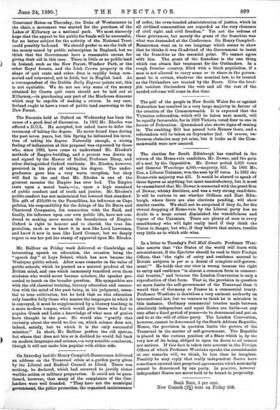The Enca3nia held at Oxford on Wednesday has been the
cause of a good deal of discussion. In 1892 Mr. Rhodes was offered a D.C.L. He accepted, but asked leave to defer the ceremony of taking the degree. He never found time during the past seven years, but this Spring he intimated his inten- tion of taking his degree. Naturally enough, a strong feeling of indignation at this proposal was expressed by those who, since 1892, have come to understand Mr. Rhodes's methods of Empire-building, and a protest was drawn up and signed by the Master of Balliol, Professor Dicey, and other distinguished Oxford residents. Mr. Rhodes, however, persisted in his plan of taking his degree. The under- graduates gave him a very warm reception, but they will find in the end that Mr. Rhodes is one of the greatest enemies the Empire has ever had. The Empire rests upon a moral basis,—i.e., upon a high standard of public conduct and of truth and justice. Mr. Rhodes's public conduct has not maintained but lowered that standard. His gift of £10,000 to the Parnellites, his influence on Cape politics, his responsibility for the doings of the De Beers and Chartered Companies, his connection with the Raid, and finally, his influence upon our own public life, have not con- duced to making more secure the foundations of Empire. Oxford is right to honour and to cherish the true Im- perialism, such as we knew it in men like Lord Lawrence, and know it now in men like Lord Cromer, but we deeply regret to see her put her stamp of approval upon Mr. Rhodes.


















































 Previous page
Previous page